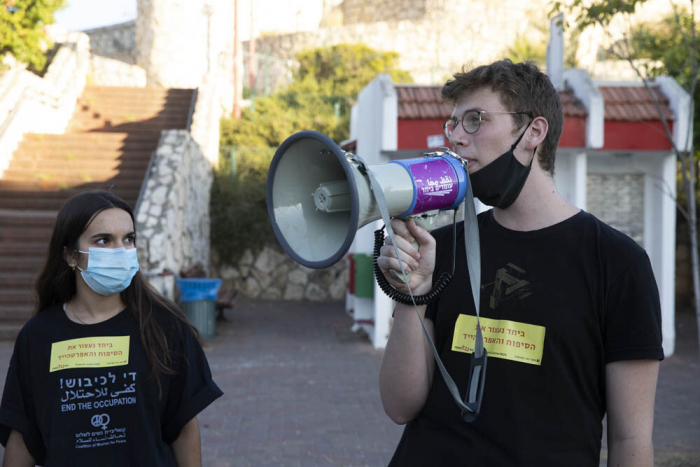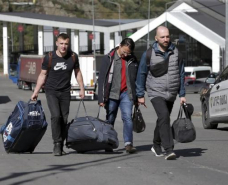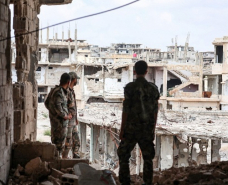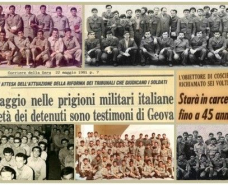The Israeli “Refusers”

When Israeli children play with toy soldiers, it’s not just a game, a fantasy or an aspiration. It is a fact of life that they will serve in the military, usually right after high school. When children hear stories from family members about their time in the military, it is not just from a father or one aunt or cousin. Nearly all (male and female) adult family members have stories to tell about their time in the Israeli Defense Force (IDF). There are exemptions for Orthodox Jews, the mentally or physically unqualified, young mothers, Arab Israelis, and a few others, but it is rare for a citizen to be deemed a conscientious objector. To seek CO status in Israeli society is considered the ultimate betrayal and a process that will bring certain suffering to the individual.
The IDF is commonly referred to as “The People’s Army.” It is required service, a rite of passage, one’s patriotic duty. For a young person to question this obligation is truly an act of courage, and with it comes the knowledge that s/he will be shunned by family, peers and society. The typical labels are used: coward, traitor, extremist, deviant, gibush (someone who doesn’t pull their weight). When a family member is an identified refuser or refusenik (savarim in Hebrew), the entire family suffers community scorn.
Despite these societal pressures, there have been pacifists in
Israel/Palestine since the 1940s and since British rule. Most early protest came from the Communist Party. Then, in the 1960s, thousands of young leftwing Jews and non-Jews from around the world flocked to Israel, drawn by the socialistic, progressive structure of the kibbutzim (communal farms). In 1962, The Israeli Socialist Organization, also known as Matzpen (Hebrew for “compass”), was formed. Opposed to all forms of human exploitation, oppression and discrimination, members strove for Arab-Jewish coexistence based on full equality and Palestinian human and national rights. But it wasn’t until the late 1970s that organizations formed specifically with peace as their goal. During the war with Lebanon in 1982 the first major organized refusal to serve occurred. Enlisted soldiers refused to go to Lebanon to fight what they determined was an occupying act of aggression by Israel.
Today’s refusers arrive at their decisions in a variety of ways. Some have come from a year of community service after high school. That service may have included working with Palestinians in the West Bank, where the reality of the situation has a profound impact. Other young people participate at various times in programs run by peace organizations, where Palestinians and Israeli Jews come together for camps, workshops and other events. These cultural exchanges lead to a new awareness and lasting friendships.
In recent years, more high school seniors have been drawn to the process of becoming refusers. In January 2021, 120 students signed a letter declaring themselves to be refusers. The letter, known as the “Shministim Letter” (shministim refers to high school seniors), is not the first of its kind.
There have been several in the past 50 years. The first was in 1970, during the War of Attrition (Israel/Egypt).
In 2002, the Israeli High Court of Justice clarified conscientious objector status. While refusal to serve based on one’s conscience is legal, it is very difficult to prove. What is not legal is “selective refusal,” which is based on opposition to government policy regarding specific military or political actions (e.g., occupation). Other disallowed categories include “absence from service without permission,” with a maximum punishment of three years, and desertion, which carries a penalty of up to 15 years in prison and a permanent criminal record. There is no statute of limitation. Being out of the country is not an acceptable excuse. Citizens can be arrested upon return.
The procedure for declaring conscientious objection status goes through military channels. It is handled as that of a soldier refusing to obey orders. On the scheduled day of military induction, a person declares that s/he refuses to enter the military compound based on conscience. The person is sent immediately to the Military Conscience Committee. Usually, the panel is not convinced of the conscientious objector argument and the young person goes to military prison for 10 to 15 days. Afterwards, they reappear in front of the committee. The process repeats itself and the young man or woman is returned to prison to work and think further about their decision. This process repeats over and over, with some spending months in prison. Finally, those who do not change their minds are commonly referred to the Medical Corps to be declared mentally unfit. Some agree to military service in noncombat positions. Those who prefer to quietly avoid this prison process entirely will find a doctor or psychiatrist who is willing to have them diagnosed as mentally or physically unfit previous to the induction process.
It is common for letters to include diagnoses of anorexia, depression, schizophrenia, addiction, and so forth.
One refuser, Atalya Ben-Abba, is featured in a documentary, “Objector” (2019). This award-winning film, produced by Amitai Ben-Abba (Atalya’s brother), Molly Stuart and Daniel Bernardi, focuses on the process that Atalya goes through to make her decision to become a refuser. Her community service work and participation in various forums and meetings previous to induction are instrumental. She suffers pressure from her parents and her grandfather, all of whom served in the military. Only her brother is supportive of her decision. On the way to the induction, driving with her parents and her brother, her father sings “The Marine’s Hymn.” Her brother responds with “Ain’t gonna study war no more.” Atalya spends a total of 110 days in military prison and returns to her family determined to continue her activism. Her own parents, inspired by their daughter’s convictions, begin to understand her point of view. Currently, Atalya continues to do community service. The film can be seen on Vimeo or Amazon Prime.
There are now many organizations that are dedicated to the gradual but meaningful work of building bridges through educational activities, cultural interactions, camps for children and young adults, discussion groups, seminars. Palestinian and Jewish Israelis gain new understanding that make fighting each other seem ludicrous. All of the following organizations were used in the preparation of this article.
- New Profile (www.newprofile.org): A feminist peace organization founded in 1998 by one of Israel’s leading peace activists, Rela Mazali.
- Refuser Solidarity Network (www.refuser.org): A non-profit based in New York, RSN has provided over $300,000 in donations to Refusers in Israel.
- Combatants for Peace (www.cfpeace.org): An organization that was formed in 2005 by ex-fighters from both Palestinian and Israeli communities and has received much international recognition for its work. It was featured in a 2016 documentary, “Disturbing the Peace.” Their work includes education of youth and the building of playgrounds, water canals, homes, solar structures.
- Jewish Voice for Peace (www.jewishvoiceforpeace.org): A leading grassroots organization in the United States that has 200,000 supporters, 10,000 donors and 60 chapters nationwide. Formed in 1996 by undergraduate students at UC Berkeley, its goals are to work for peace, social justice and human rights for all Israelis and Palestinians.
- Coalition of Women for Peace (CWP): An umbrella group believing in gradual, persistent, ongoing grassroots work. They also protest the fact that peace organizations are often denied visibility in the press.
- +972 (www.972mag.com): An online non-profit magazine by Palestinian and Israeli journalists with a range of views. Peace activists and refusers who are often invisible to the mainstream Israeli press receive extensive coverage from this group.
This article is by Paula Hoffman-Villanueva from Draft NOtices, the newsletter of the Committee Opposed to Militarism and the Draft (http://www.comdsd.org/).
###
Countering Military Recruitment

WRI's new booklet, Countering Military Recruitment: Learning the lessons of counter-recruitment campaigns internationally, is out now. The booklet includes examples of campaigning against youth militarisation across different countries with the contribution of grassroot activists.
You can order a paperback version here.








